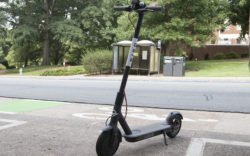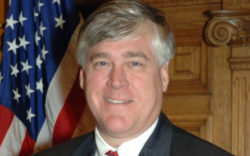Athens-Clarke County commissioners asked few questions last week as Mayor Nancy Denson’s 25-member Economic Development Task Force gave its recommendations. That citizens committee has met for nine months, with many members putting in a lot of hours, Denson said.Â
Despite recently landing a new Caterpillar factory, Athens has long been viewed by state economic development personnel and in earlier reports as a weak competitor for new industries, having failed to put forth strong or coherent sales pitches.Â
In response, the task force looked at business recruitment efforts in other cities, and the roles of the ten or so local authorities and departments that are already involved in economic development here. It didn’t recommend extensive reorganization of current efforts, but says the various groups need to talk to each other more, by forming a new Economic Development Council made up of representatives from those agencies.  It says more money needs to be spent, perhaps for incentives to businesses, for marketing and for “a highly skilled and expanded staff” although no specific budget figures were proposed by the task force. And it recommends a tax increase of one-half mill (corresponding to about $25 on an average homeowner’s bill) to pay for it. That would raise nearly $1.6 million annually, supplementing the $600,000 that already goes to economic development efforts.Â
The recommendations now go to a subcommittee of four ACC commissioners appointed by the mayor: Harry Sims, Andy Herod, Kelly Girtz and Kathy Hoard. That’s “typically the way [commissioners] would work on anything,” Herod told Flagpole; a smaller group vets proposals before they go to the full commission. That takes time, but it’s more important to “make sure we get this right, rather than meet a deadline,” he says. Herod also serves on the Economic Development Foundation board; he think Athens is already doing a better job at economic development. “I think in some ways we’ve just been unlucky,” he says. Before it landed Caterpillar, Athens had been a finalist more than once. But Caterpillar said its choice of Athens “had a lot to do with quality of life,” Herod said, which suggests that earlier investments by local government are bearing fruit to make Athens more attractive.    Â
Other recommendations of the task force were that ACC should capitalize on its potential strengths as a tourism and retirement destination and regional healthcare center, as well as seeking “creative” businesses like film and music. “The opening of the medical campus on Prince Avenue… signals the expansion of an economic strategy that will endure and build for many years to come,” the task force report says. ACC needs to have “close-the-deal” money ready (for incentives like utility lines), and land or buildings ready for industrial prospects. Because Clarke is Georgia’s smallest county and is mostly already developed, “there are a limited number of desirable sites in commercial areas,” the task force report says. “These sites are heavily influenced by the NIMBY (not in my back yard) attitude. The benefits to the entire area should be weighed in the decision-making process.”
Some commercial building requirements are too stringent, the task force says, like limiting parking, and allowing it only in the rear of new buildings. That’s part of a local effort to make buildings attractive and walkable, but it should not apply to all businesses, or in industrial zones, the report says. “Many interviewees cited delays in permitting and onerous regulations for industrial customers as significant barriers to expansion of existing companies and recruitment of new businesses,” it says. ACC should hire an “ombudsman” to help applicants through the county’s requirements, it says, and should modify processes so applicants don’t have to draw up expensive plans that end up being rejected.
Other suggestions include developing a destination museum at the former O’Malley’s tavern, a river walk and an amphitheater between the Classic convention convention center and the river; encouraging some of ACC’s many nonprofit groups (estimated at over 600) to “collaborate or even merge” to avoid duplicating efforts; “marketing” the strengths of Clarke county’s public schools to counter “a general public perception” that they are subpar, and adding school mentoring and apprenticeships with businesses.
Like what you just read? Support Flagpole by making a donation today. Every dollar you give helps fund our ongoing mission to provide Athens with quality, independent journalism.










